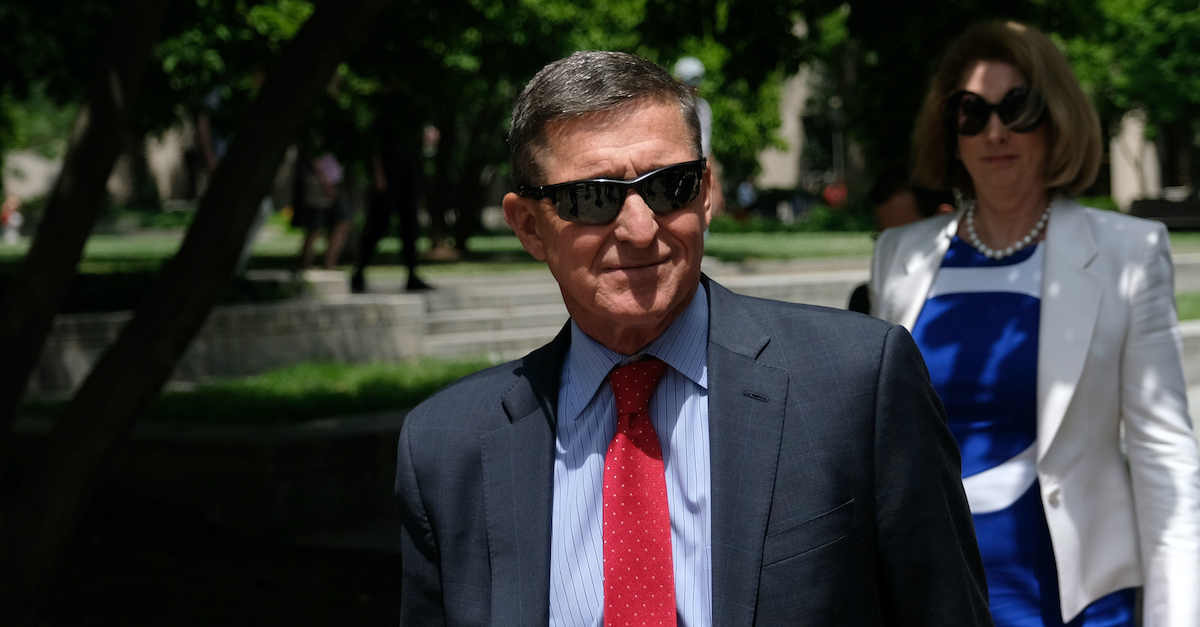
The Department of Justice filed President Donald Trump’s pardon of former national security advisor and retired Lt. Gen. Michael Flynn in U.S. District Judge Emmet Sullivan’s court on Monday, along with a consent motion to dismiss the case as moot.
The DOJ filing noted that the pardon covers a lot—including any perjury or contempt charges that Judge Sullivan’s court-appointed amicus John Gleeson argued in favor of during drawn out proceedings over the Rule 48(a) “leave of court” issue after the DOJ-Flynn joint motion to dismiss the criminal case. The “full and unconditional” pardon also insulates Flynn from being prosecuted for “any and all possible offenses” uncovered during Special Counsel Robert Mueller’s investigation.
The words “any and all possible offenses” appeared multiple times [emphases ours]:
On November 25, 2020, the President of the United States issued an executive grant of clemency to Michael T. Flynn. In particular, the President granted General Flynn ‘a full and unconditional pardon‘ for (1) the charge of making false statements to Federal investigators, in violation of Section 1001, Title 18, United States Code, as charged in the Information filed in this case (Doc. 1); (2) any and all possible offenses arising from the facts set forth in the Information and Statement of Offense filed under that docket number or that might arise, or be charged, claimed, or asserted, in connection with the proceedings under that docket number (Doc. 4); (3) any and all possible offenses within the investigatory authority or jurisdiction of the Special Counsel appointed on May 17, 2017, including the initial Appointment Order No. 3915-2017 and subsequent memoranda regarding the Special Counsel’s investigatory authority; and (4) any and all possible offenses arising out of facts and circumstances known to, identified by, or in any manner related to the investigation of the Special Counsel, including, but not limited to, any grand jury proceedings in the United States District Court for the District of Columbia or the United States District Court for the Eastern District of Virginia.
[…]
Accordingly, the President’s pardon, which General Flynn has accepted, moots this case. United States v. Schaffer, 240 F.3d 35, 38 (D.C. Cir. 2001). The pardon not only encompasses the Section 1001 charge that is the subject of the government’s pending motion to dismiss (Doc. 198), but also any possible future perjury or contempt charge in connection with General Flynn’s sworn statements and any other possible future charge that this Court or the court-appointed amicus has suggested might somehow keep this criminal case alive over the government’s objection (e.g., a charge under the Foreign Agents Registration Act, Section 618(a), Title 22, United States Code, arising out of the facts set forth in the Statement of Offense). In short, the government’s prior motion to dismiss, as well as all other pending motions in this case, are moot in light of the President’s full and unconditional pardon to General Flynn. No further proceedings are necessary or appropriate, as the Court must immediately dismiss the case with prejudice. Schaffer, 240 F.3d at 38.
Flynn previously pleaded guilty to lying to the FBI about his conversations with Russian Ambassador Sergey Kislyak on the subject of sanctions during the transition in late 2016. Flynn was never sentenced. Instead, Flynn fired his lawyers, hired Sidney Powell, and moved to withdraw his plea—claiming that the prosecution had withheld exculpatory evidence and that the FBI had entrapped him. Eventually, the Department of Justice and Flynn’s legal team became one and the same: the prosecution and defense agreed that there should be no criminal case.
Judge Sullivan, rather than immediately granting the motion to dismiss, appointed Gleeson, a former mob prosecutor, to argue against the dismissal of the case and to argue whether Flynn should be held in contempt for perjury. Gleeson said, in straightforward fashion, that Flynn perjured himself and ought to be punished for it.
Over the summer, the case ping-ponged from the U.S. District Court for the District of Columbia to the U.S. Court of Appeals for the District of Columbia Circuit to the en banc D.C. Circuit and back down to the district court again for more fireworks.
“I’m from Brooklyn, not for nothing, but this crime was committed in the West Wing,” Gleeson erupted during a virtual hearing in late September.
In advance of a much-anticipated Judge Sullivan ruling on the motion to dismiss, President Trump pardoned Flynn.
Read both documents, including the official language of the pardon, below:
[Image via Alex Wroblewski/Getty Images]